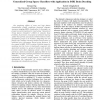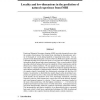133
click to vote
ICASSP
2011
IEEE
14 years 5 months ago
2011
IEEE
The Support Vector Machine (SVM) methodology is an effective, supervised, machine learning method that gives stateof-the-art performance for brain state classification from funct...
135
click to vote
CVPR
2011
IEEE
14 years 5 months ago
2011
IEEE
The perplexing effects of noise and high feature dimensionality greatly complicate functional magnetic resonance imaging (fMRI) classification. In this paper, we present a novel f...
123
click to vote
TMI
2010
14 years 8 months ago
2010
Classification of brain images obtained through functional magnetic resonance imaging (fMRI) poses a serious challenge to pattern recognition and machine learning due to the extrem...
158
click to vote
JMLR
2011
14 years 9 months ago
2011
This review focuses on dynamic causal analysis of functional magnetic resonance (fMRI) data to infer brain connectivity from a time series analysis and dynamical systems perspecti...
143
click to vote
ICASSP
2009
IEEE
14 years 11 months ago
2009
IEEE
In this paper, a novel non-stationary model of functional Magnetic Resonance Imaging (fMRI) time series is proposed. It allows us to account for some putative habituation effect a...
135
click to vote
ICASSP
2010
IEEE
15 years 17 days ago
2010
IEEE
Data-driven analysis methods, in particular independent component analysis (ICA) has proven quite useful for the analysis of functional magnetic imaging (fMRI) data. In addition, ...
IJON
2006
15 years 2 months ago
2006
Abstract. Independent component analysis (ICA) of functional magnetic resonance imaging (fMRI) data is commonly carried out under the assumption that each source may be represented...
131
click to vote
NIPS
2007
15 years 3 months ago
2007
Functional Magnetic Resonance Imaging (fMRI) provides dynamical access into the complex functioning of the human brain, detailing the hemodynamic activity of thousands of voxels d...
121
click to vote
MICCAI
1999
Springer
15 years 6 months ago
1999
Springer
Abstract. A new information-theoretic approach is presented for analyzing fMRI data to calculate the brain activation map. The method is based on a formulation of the mutualinforma...
125
click to vote
ENC
2007
IEEE
15 years 8 months ago
2007
IEEE
This manuscript proposes a retrieval system for fMRI brain images. Our goal is to find a similaritymetric to enable us to support queries for “similar tasks” for retrieval on...



